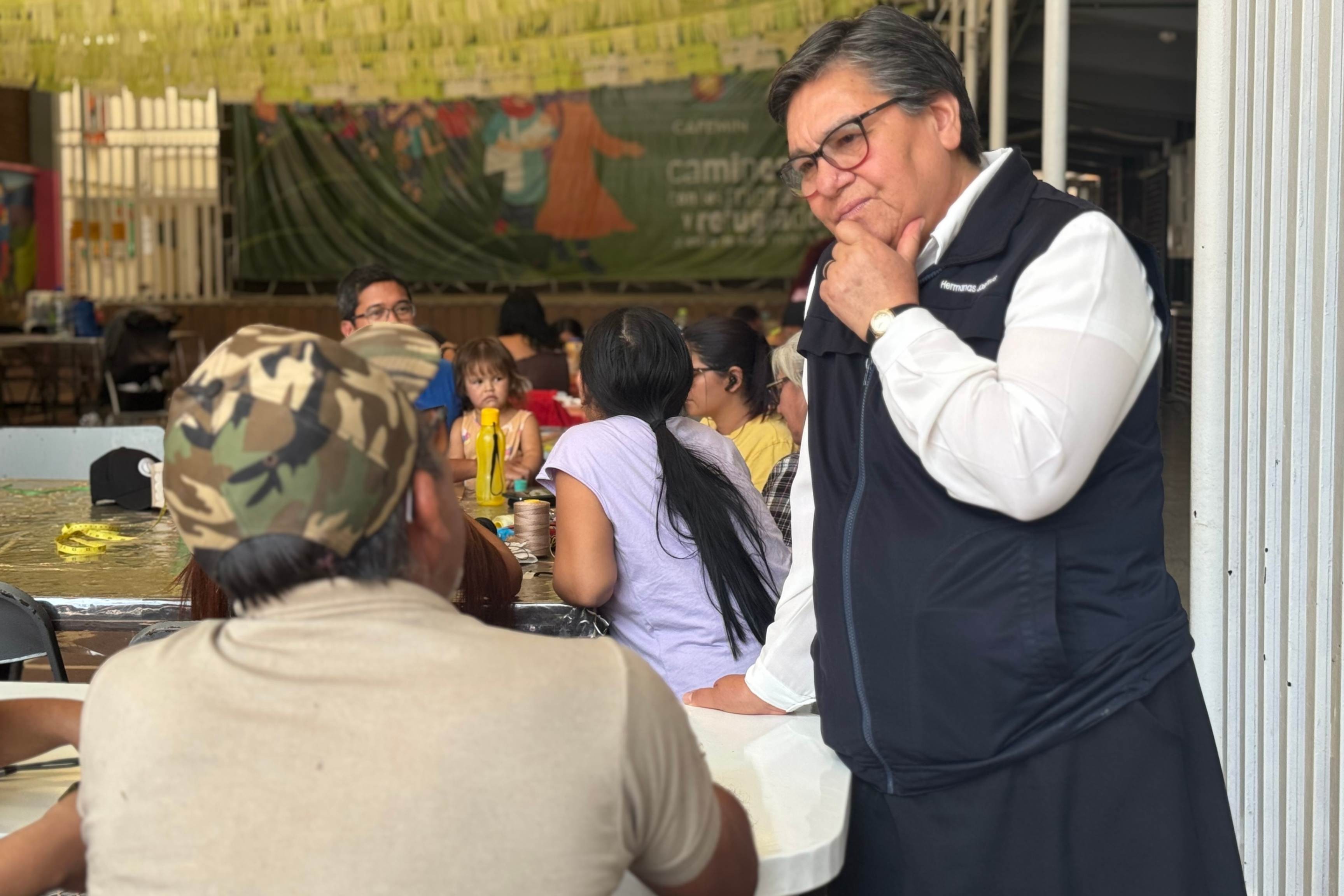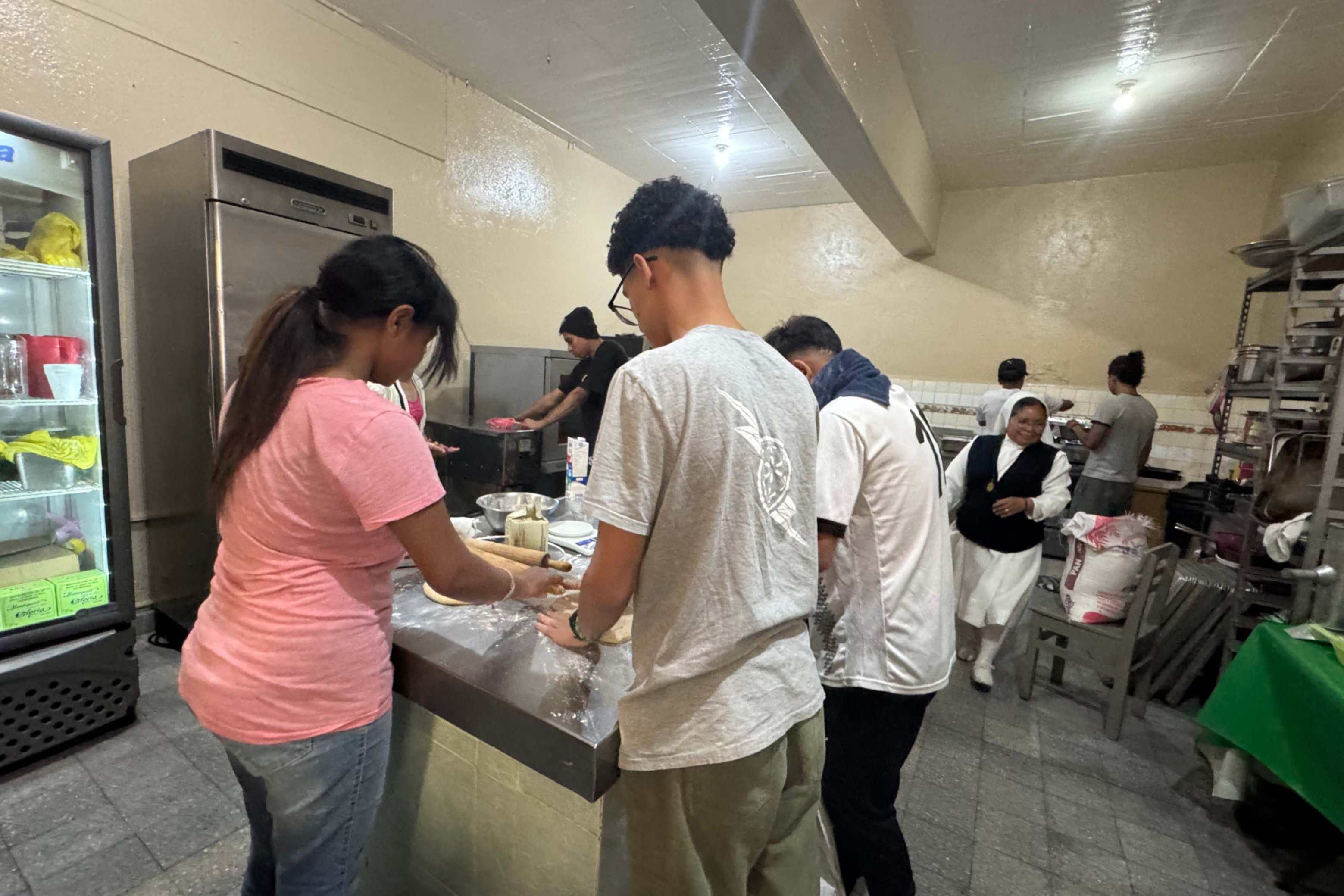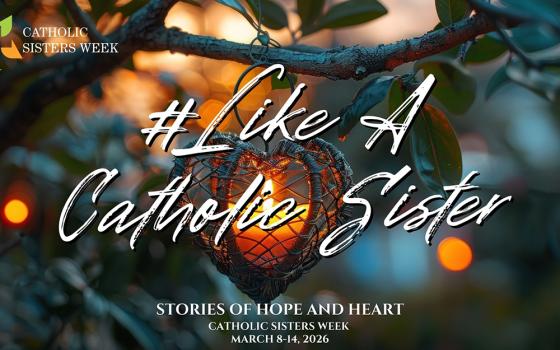
Sr. María Magdalena Silva Rentería listens to a man looking for work Apr 1, 2025, at the CAFEMIN shelter in Mexico City. (GSR photo/Rhina Guidos)
It is difficult to know how many have passed by the mural at the shelter run by the Josephine sisters in Mexico City and shared the sentiment written on the wall: "Dreams travel on a train without fear of crossing borders."
One of the dreams likely shared by the thousands who have passed through CAFEMIN, the sisters' shelter for migrant women and families, is to get to the United States. It's something some of them want so badly that it leads them to believe that U.S. President Donald Trump will change his mind about migrants and his policy toward them and let them into the country, said Sr. María Magdalena Silva Rentería.
"I don't think we'll see that miracle, but we have to continue accompanying them because they have that hope," said Silva, the shelter's executive director.
Along with other sisters and a team of collaborators, Silva accompanies and advocates for migrants traveling through the country, which used to be the last stop en route to the ultimate destination: the U.S.
But their mission has become much more difficult since Trump took office for a second term earlier this year, dismantling not only the legal paths many used to enter the U.S., but also cutting humanitarian aid for migrants.
"Jan. 20 marks a whole new paradigm for the migrant world," Silva said of the day Trump began his second term.
It affected not only migrants who were unable to move forward, but also those who help them, and it has been profound, Silva said.
The Josephine Sisters in Mexico face a new challenge: the 'reverse migration' of people who want to return to their countries due to restrictive immigration policies in the Trump era.
The U.N. refugee agency UNHCR announced in April the closure of four offices in Mexico after the Trump administration cut 60% of its budget; the International Organization for Migration also announced layoffs in the country due to cuts; and the U.S. Agency for International Development, which helped finance medical and psychological assistance for migrants, was effectively eliminated July 1.
Some of those organizations provided trained staff to help migrants suffering from exploitation, physical and sexual abuse, and those fighting human trafficking and other forms of violence, Silva said. Some helped migrants return safely to their home countries when they were deported, while others helped them find alternative places of refuge when they could not return.
Aid organizations' absence has left places like CAFEMIN scrambling to meet needs that go beyond food, shelter and companionship provided by the sisters and other religious ministries.
In addition, in places like Mexico, a new phenomenon has emerged called "reverse migration," referring to "migrants [who] abandon their journey to the U.S.-Mexico border and begin traveling south," back to their country of origin, the Niskanen Center said in a report published in April.
Public information on the new flow of migrants is scarce, says the center, since many countries have not released figures on the number of people returning, but the phenomenon is evident in places such as CAFEMIN and a nearby migrant camp along the railroad tracks. That's where Mario Monroy, outreach coordinator for CAFEMIN, listens to the needs and now shattered dreams of those who cannot go north or south.
"We would already be there" in the U.S., said a young woman in the camp, who identified herself as Yesenia, a native of Venezuela, whose mother had secured an appointment through the CBP One app, which disappeared on Jan. 20.
The mobile tool was used during President Joe Biden's administration to secure an appointment at U.S. ports of entry to start the asylum application process. Thousands of Venezuelans, Haitians, Nicaraguans and Cubans used it to enter the country safely while seeking refuge from political, economic and other problems in their home countries. But, like the flow of migrants, the app took a turn at the start of Trump's new term and was renamed CBP Home, urging those who had used it to return to their countries.
'I don't think we'll see that miracle [of a change in U.S. policies], but we have to continue accompanying them because they have that hope.'
—Sr. María Magdalena Silva Rentería, CAFEMIN's executive director
Jesús Ricardo Rojas Romero, another Venezuelan from the camp, said he did not have the opportunity to present his case because he was never offered an appointment. And now, along with other migrants, he is stuck in Mexico City due to Mexico's restrictions, which limit migrants' movements and their ability to work.
In an attempt to appease the Trump administration and avoid increased tariffs, the Mexican government has cracked down on migrants trying to advance toward the U.S. border.
Authorities have rounded up groups of migrants in various parts of the country, even using military help to prevent them from heading north, Silva said. Unable to work or move, some migrants play music, ask for alms, sell food — anything to survive the day.
Monroy said he tells those new to working with migrants that the mission involves facing the cruelest side of humanity.
"Cruelty has shaped experiences and bodies. I tell the team that works with me that to face that human cruelty, you need to do it with kindness" toward the migrants, he said.
Monroy, who was injured while trying to protect migrants as authorities advanced with physical force toward a caravan, said he knows exactly who he's defending — as do sisters like Silva, who say they will not abandon the migrants, even if conditions worsen.
"Consecrated life will remain" with the migrants, Silva said. "They are the ones who will hold on no matter what happens, but this is bad," she said.
Monroy said he once asked a sister at the shelter how she knew God existed, and she replied that she knew because God is love and she constantly sees acts of love in her ministry. Monroy said that made him feel sorry for those in the U.S. who miss the opportunity to experience God in those acts of love found in serving those others don't care about.
"She told me that God is an act of love and that in the end we will be judged by how much we love," he said. "I would say to society in the United States that they are missing a great opportunity to love, they are missing a great opportunity to know God, because these people cling so much to life. They travel thousands of miles, country after country, looking to survive. They are not a burden," he added.
It is true that there are obstacles that seem insurmountable, said Silva, who added that "the dream of reaching the United States is an impossible dream" at the moment. But she believes in the wisdom of the people making that journey, and says it's enough that they know why they made the decision to leave home.
Because of the environment of scarcity, those who accompany migrants will now face challenges that may lead them to discover new methods of helping that do not depend on the help of richer countries, she said.
"I say, then, bless Donald Trump for putting us in our place and making us see that we will have to address the issue of the sustainability of shelters so that we are not smacked by these situations," she said, adding: "This is a complete change."
This story was originally published in Spanish June 23, 2025, and has been updated.









